Russell Westbrook: European 'offenses are 10 times better than NBA offense'

The shots may not always go in at an absurd rate. The talent, clearly, is not the same. The teams rarely top their NBA counterparts, and the influx of draft lottery-prospects imported from European countries usually runs at a rate of about one per year. Still, there is no denying that international basketball usually does its best work on the offensive end, in ways that often outshine NBA squads in terms of pure aesthetics, or often even overall on-court efficiency.
[The 2016-17 BDL 25: The key storylines to watch this NBA season]
Oklahoma City Thunder guard Russell Westbrook was the latest to go on record discussing as much, in the wake of his team’s two exhibition contests against Real Madrid and FC Barcelona. The Thunder lost to Real Madrid in overtime by a 142-137 score prior to downing FC Barcelona 92-89 this week.
Westbrook, in the wake of the 1-1 run up against some of Europe’s best, was effusive in his praise. From Fred Katz at the Norman Transcript:
“I think one thing people don’t realize is guarding teams in Europe,” Russell Westbrook prefaced. “Their offenses are 10 times better than NBA offense just because they move around a lot. A lot of movement and not as much talent so they have to do different things to be able to score the basketball.”
Here is his full breakdown:
Thought this quote from Russell Westbrook about how offenses in Europe "are 10 times better than NBA offense" was interesting: pic.twitter.com/Ryspbd7LCC
— Fred Katz (@FredKatz) October 8, 2016
It’s a line of thinking that heaps of sportswriters have explored since international teams had the audacity to come a little too close to American international collectives in the years since the 1992 Men’s Basketball Dream Team traipsed all over the Olympic stage.
[ | Mock Draft | The Vertical | Latest news]
[Follow Dunks Don’t Lie on Tumblr: The best slams from all of basketball]
The truth is that the 1992 Dream Team was aided in several ways by the works of the times. Political upheaval broke up the basketball foundation of a pair of Team USA’s chief rivals. Top NBA stars all committed to the summer-long event, which for the first time would feature stateside professionals. And, if we’re honest, some of the team’s opponents entered each game just hoping to stay within 55 points.
There is also another uncomfortable truth beyond the US vs. European difference in offensive application. Times have changed in innumerable ways since 1992, and despite the brilliant work of scores of NBA coaches it cannot be argued that the typical NBA offense (one that would destroy a top international team in a seven-game series) works in the same advanced setting that a European’s club acts within.
At the risk of unleashing an Andy Rooney impersonation on an autumn Sunday, NBA stars and by extension NBA offenses just aren’t raised the same way they used to be.
Top players leave college after one or at absolute most two NCAA seasons, which is good for both the player and the NBA. Only a misguided observer would argue that more time spent working under NCAA coaching and the myriad rules both on court (different defensive applications, lesser teammates and opposition) and off (the limited practice time and smaller schedule) is better for a player than working as a paid professional within the NBA confines.
Still, even with that two or three year advantage on the sort of underclassmen that jumped to the NBA during the Dream Team’s time, it isn’t enough to create the sort of atmosphere that lends itself to developing the sort of chemistry that we see on the international stage. The top-heavy roster creation that dots AAU, high school, NCAA and often NBA teams (especially for the lousier franchises, working with last year’s lottery pick at the lead) forces coaches to lean on simplified play just to keep things competitive with that one star in hand.
The penny-wise and pound-foolish (in figurative terms, as these coaches often go on to make bank on the bank of these unpaid “amateur” athletes) work of coaches in the AAU, high school and NCAA realms only adds to the minimalization and lack of creative forethought. Why push for something greater at the expense of initial satisfaction, when your greatest player is going to moving on in a matter of months?
As such, lesser teams in European leagues, where player parity reigns, have to rely on other means for securing sound looks at the basket.
Make no mistake, Rooney-ites, NBA offenses are as exacting and distinguished as they’ve ever been. As potent as they’ve ever been. NBA coaching is as smart as it has ever been. The league does not roll the ball out, and anyone that tells you as much just isn’t paying attention.
Its offensive movement, however, pales in comparison to the movement you’ll see consistently from European teams. Mostly, due to the NBA’s strengths, because stateside stars are just too talented to need to consistently rely on the sort of movement necessary to turn international clubs into winners.
– – – – – – –
Kelly Dwyer is an editor for Ball Don’t Lie on Yahoo Sports. Have a tip? Email him at KDonhoops@yahoo.com or follow him on Twitter!

